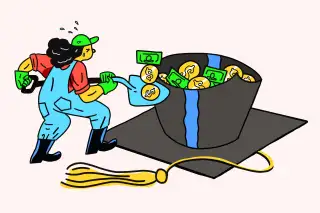What Happens if You Skip a Student Loan Payment?

We get it — money is tight right now. But if you're considering skipping a student loan payment in order to make a little room in your budget, beware the consequences.
In normal, non-pandemic life, “there’s an expectation” that borrowers will make on-time payments, says Nicole Stovall, consumer lending manager with Affinity Federal Credit Union. Because payment history is such a big influence on your credit score, missing a bill can come with pretty severe consequences.
“Your lender is going to report you to the credit bureaus,” Stovall adds. “You’re going to see a drastic reduction in your credit score just for one missed payment.”
The timeline for when you actually see that impact varies based on the type of student loan you have. Federal loans become delinquent the first day after you miss a payment. The servicer will report it to the credit bureaus after 90 days, and later it could go into default. Private loan policies are often stricter. They depend on the specific company you're dealing with and may involve late fees.
Some lenders will offer deferment or forbearance if you contact them and prove financial hardship. These options allow you to temporarily postpone student loan payments.
“The notion of skipping is never a good idea,” says Stacey MacPhetres, a college finance consultant with Bright Horizons. “But there are ways of doing it that won't harm you long-term.”
Fortunately, the situation is different in 2020.
Thanks to the pandemic, mass layoffs and the general awful state of the economy, the government put some student loans on hold this spring. Federally held student loans were automatically placed into administrative forbearance, meaning borrowers were not required to make payments on them for a set period of time. Interest rates were also set to 0%, meaning people weren’t penalized for taking advantage of the pause.
President Donald Trump recently extended this policy through the end of the year, so “you are under no obligation to make any payments right now,” MacPhetres says.
Even though they don’t have to, she recommended people who can afford to still make their regular student loan payments do so. Because interest isn’t accruing, the loan amount isn’t growing. Payments will go directly toward reducing the principal — paying off the loan faster. Nice.
If life is stressing you out, you could hold onto your payments and instead beef up your emergency fund. You'll have a nice safety net, and if everything works out OK, you can still make a big dent in your loans right before Trump unpauses things.
Remember: This only applies to federal student loans. Private loans are another story. Stovall said many lenders are offering forbearance options to customers during the pandemic, though interest will likely accrue.
“I really don’t know of anyone who’s said, ‘No, you have to make your payment,’” she adds. “Every financial institution out there has said, ‘What do you need? How can we help you?’”
Bottom line? Skipping a student loan payment can wreck your credit. It’s less harmful during the pandemic due to special policies designed to relieve pressure on borrowers, but the details hinge on whether your loan is federal or private.
One tip is always applicable: You should never ignore your lenders. Coronavirus or not, if you're in a tight spot, you should contact them and tell them you're struggling.
“Most of the time, if you’re communicating with your lenders, they’re going to work with you,” MacPhetres says.
More from Money:
What Happens to Your Student Loans If You Die?
Are Student Loans Still Paused? Here's What Borrowers Should Know for the Rest of 2020
8 Essential Steps to Take Before Choosing a Private Student Loan